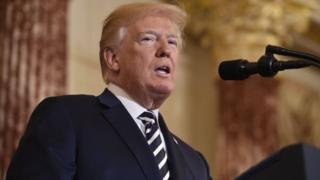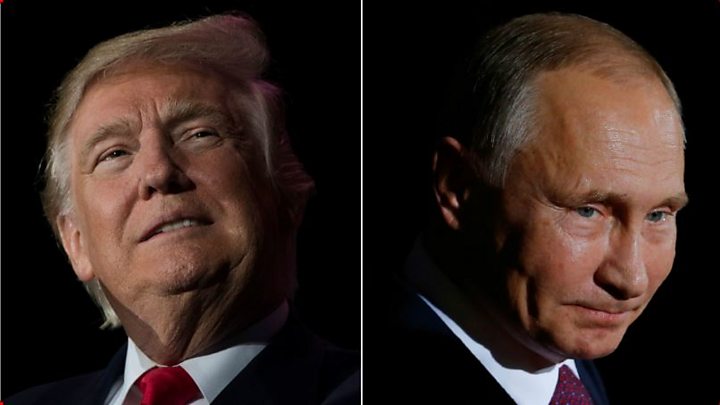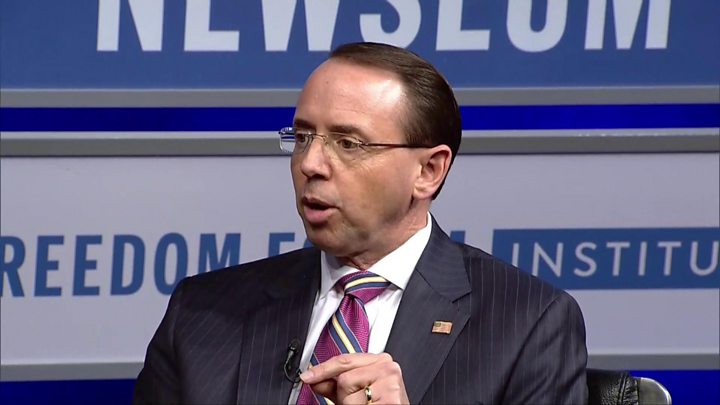 Image copyright
AFP
Image copyright
AFP
President Donald Trump's lawyer for the probe into alleged collusion between his election team and Russia is out, the latest legal shake-up in the case.
Ty Cobb will be replaced by Emmet Flood, an attorney who defended ex-President Bill Clinton during his impeachment proceedings 20 years ago.
The White House press secretary told the BBC that Mr Cobb had been considering retirement for some time.
Mr Trump and Russia have repeatedly denied suggestions of collusion.
Mr Cobb's exit comes as it emerged Robert Mueller, the US Department of Justice special counsel leading the Russia inquiry, could seek to compel Mr Trump to testify.
It is the first known time Mr Mueller has raised the possibility of a subpoena.
Why the legal shake-up?
Since Mr Trump declared last month that he was "VERY happy" with his lawyers, the team has been overhauled.
Mr Flood, a Republican lawyer, is tipped to take a more combative approach to the Mueller investigation.
Mr Cobb, who joined the White House team last August, was said to have been advising Mr Trump to co-operate fully with the Mueller investigation.
He had reportedly urged the president to allow himself to be interviewed by Mr Mueller in order to hurry along the inquiry that is overhanging his presidency.
Mr Cobb's departure emerged just hours after he told ABC News that Mr Trump facing Mr Mueller was "certainly not off the table".
Mr Trump's previous lead lawyer on the case, John Dowd, quit in March, reportedly because he felt his client was ignoring his legal counsel.
Former New York Mayor Rudolph Giuliani has joined Mr Trump's legal team to negotiate the terms of engagement for an interview of the president by the special counsel.
Mr Giuliani told the Washington Post on Wednesday such an interview would last no more than three hours under a narrow set of questions.
Several prominent law firms have reportedly declined to take Mr Trump's case.
Earlier this month it was reported the president has hired a husband-and-wife legal team, Jane and Martin Raskin, who run a law practice in a suburb of Miami, Florida.

Explosive legal battle coming?
Anthony Zurcher, BBC News, Washington
If negotiations between Donald Trump's legal team and the special counsel's office have been a delicate dance, Robert Mueller just stomped on his counterpart's toes.
A subpoena to force the president before a grand jury could start an explosive legal battle that eventually reaches the US Supreme Court. Mr Trump and his lawyers may argue that a president can't be compelled to answer such wide-ranging questions.
The president has reportedly cooled on the idea of willingly meeting the special counsel - a result of his feeling that the Mueller team is out to get him. There have been hints that his legal advisers are torn on the matter.
John Dowd, who resigned in March as the president's top personal lawyer, was said to be against an interview. Others, including recent arrival Rudy Giuliani, appear more open to co-operation.
This may explain this week's spate of revelations. Possible Mueller questions, as compiled by the president's lawyers, were splashed across front page yesterday. The subpoena threat is today's news.
Mr Mueller's team remains tight-lipped, but the evolving strategies of the president's side are playing out nearly in full view - and they may be inclined to turn this dance into a rumble.
Why would Mueller issue a subpoena?
Mr Mueller suggested the threat of a subpoena, a court order forcing a witness to appear to give testimony, during talks with Mr Trump's lawyers in March.
The president's lawyers had insisted during the meeting that the president was under no obligation to face questions by federal investigators in relation to the Russia inquiry, US media report.
However, Mr Mueller's team reportedly responded by suggesting they would issue a subpoena if Mr Trump declined.
They agreed to provide the president's lawyers with more specific information about the questions they wished to ask Mr Trump.

The list of possible questions has since been published in the New York Times.
It apparently covers the president's motivations in dismissing former FBI director James Comey last May and his campaign's contacts with Russia.
Mr Trump repeated his claim that the Russia inquiry is a "witch hunt" on Wednesday.
So will Mr Trump talk?
The US president himself has said he is willing to speak to Mr Mueller, but US media report his enthusiasm has cooled after the offices of his personal attorney were raided.
The network cites sources close to Mr Trump as saying they are yet to make a recommendation about whether he agrees to an interview with Mr Mueller. Some advisers reportedly believe Mr Mueller would not go so far as to issue a subpoena.
If one was issued, Mr Trump's lawyers could fight it in court, or he could refuse to answer questions by pleading the Fifth Amendment, a constitutional protection against potential self-incrimination.